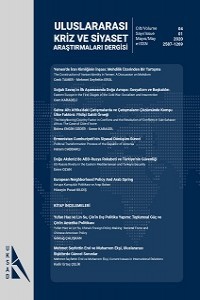Understanding Afghanistan-Pakistan Relations in a Multilateral Context
Afghanistan-Pakistan, Taliban, bilateral relations, multipolarity, international system
___
- Admission of Pakistan and Yemen to Membership in the United Nations: Report of The First Committee (document A/399). (1947). 92nd Plenary Meeting of UN General Assembly, http://www.un.org/en/ga/search/view_doc.asp?symbol=A/PV.92&Lang=E.
- Afghanistan Peace Conference Kicks off in Moscow. (2018). Al Jazeera, https://www.aljazeera.com/news/2018/11/9/afghanistan-peaceconference-kicks-off-in-moscow.
- Afghanistan. (2022). OEC World, https://oec.world/en/profile/country/afg.
- Başlangıç: 2017
- Yayıncı: Mehmet Seyfettin EROL
Fransa’nın Afganistan Politikası: Hedefler ve Zorluklar
Mehmet Seyfettin EROL, Doğacan BAŞARAN
Becoming an Army on Operations: Bundeswehr and the German Foreign Policy in the Post-Cold War Period
Beyaz Ayı ve Kızıl Ejder Kıskacında Orta Asya Devletleri’nin Çok Vektörlü Dış Politikaları
Popüler Kültürün Militarizasyonu: “Dijital Kamuflaj” ve Ötesi
Nijerya’nın Ulusal Güvenliği Kapsamında Bir Terör Örgütünün Anatomisi: Boko Haram
Understanding Afghanistan-Pakistan Relations in a Multilateral Context
1957 Krizi’nden Suriye İç Savaşı’na Türkiye’nin Suriye Politikasındaki Değişimi Anlamak
Esra CAVUSOGLU, Ayşenur TAKKAÇ
Avrupa’da Göçmen Karşıtı Tutum ve İslamofobi
Emrah Kaya, Terörizmle Mücadelede Müzakere Yöntemi ETA – LTTE – PKK – FARC
Rachel Carson, Sessiz İlkbahar, Palme Yayınevi, Çev. Çağatay Güler, İstanbul 2011, 398 S.
